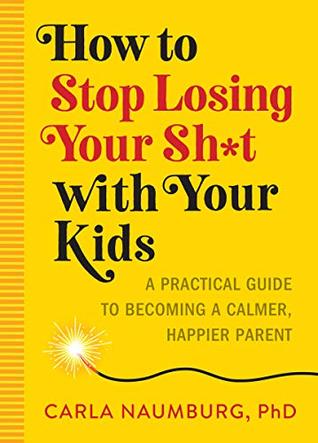More on this book
Community
Kindle Notes & Highlights
So, you’re losing your shit with your kids. You snap, shout, and scream at them. You’re irritable and reactive more often than you’d like to admit. You know how you want to parent; you want to be calmer and more intentional. But no matter how hard you try, you keep losing it.
This means you can let go of some of the guilt, stress, and shame you’ve been hanging on to, and you probably don’t need to fully fund the kids’ therapy accounts just yet.
Even so, losing your shit sucks. It’s exhausting and feels awful for everyone. It stresses out your kids, strains your relationship with them,
and makes you doubt yourself and your parenting abilities.
Rather than talking about bad parents, let’s talk about parents who are struggling—a lot—and don’t yet have the right information, resources, and support.
Kids push buttons for lots of different reasons. They do it because they want our attention, they’re trying to get what they need, and they don’t have the maturity or impulse control to do otherwise.
In addition, children will be more likely to push buttons when they’re triggered—because they’re tired, hungry, confused, scared, excited, anxious, or otherwise overwhelmed by Big Feelings. It is totally reasonable to help your children in these moments, to redirect, feed, or soothe them. Each time you do that, you’re modeling an effective way to respond to their triggers.
The secret to staying calm is self-awareness; it’s about noticing you’re about to explode and giving yourself a chance to calm down.
This is why you can’t simply decide to not lose your shit and then just not lose it. Your explosions are a predictable outcome of developmental, neurological, and biological processes, rather than logical decisions.
Insults and threats are particularly damaging, as is physical aggression or violence of any kind, including hitting, slapping, spanking, or throwing things.
Toxic explosions are unpredictable, disproportionate reactions that can include angry words, physical outbursts, personal attacks, shame, and blame. The moment feels out of control. Toxic outbursts happen when we are triggered, and they
continue to trigger everyone involved. Examples may include screaming at your child over spilled cereal, exploding because he’s taking too long to put on his shoes, or angrily berating a daughter for forgetting her homework. These reactive explosions can rupture and weaken the connection between you and your child.
Having said that, most of us resort to a few habitual behaviors (snapping, screaming, slamming, etc.) when we lose it, and it’s super important that you get clear on exactly what you do when you freak out because that behavior is the only thing you can control.
Conflict and disconnection and unpleasant feelings and strong emotions are all completely normal and reasonable and acceptable, and they don’t mean you’re doing anything wrong.
You can be overwhelmed by emotions and still not lose your shit. You can be deeply pissed off or scared or sad or confused, and still not reach a toxic level. You can let your kids know you’re having Big Feelings without exploding all over them.
Every time you blow up, your nervous system gets all jacked up and your stress hormones go through the roof, which negatively impacts virtually every part of your body. Eventually, chronic stress can increase your blood pressure, weaken your immune system, cause migraines, and screw up your sleep. Frequent explosions and the related stress lead to long-term health issues. But it’s not just about the impact on your body. Over time, your explosions will literally rewire your brain, and not in a good way. The more you lose it with your kids, the stronger and more connected your “lose it” neuronal
...more
Our tantrums can leave our kids feeling anxious, ashamed, scared, and disconnected, which makes it harder for them to learn and integrate new information, tolerate new experiences (whether it’s a new food on their plate or the first day at a new school), and generally function well in daily life. The strong, unpleasant feelings they have in response to our explosions can also trigger kids and make it more likely that they’ll act out and have meltdowns of their own.
It’s certainly possible that if you scare the crap out of your children often enough, they’ll do whatever you want just to keep you from losing it again. But walking on eggshells around someone is not the same as respecting them, and as soon as your kids are old enough to take some control over their time and space, they’re going to react to you the same way you did the last time you worked for an explosive, unpredictable boss: AVOID. AVOID. AVOID. Once they disconnect from you in that way, parenting becomes a lot harder and less fun. While it’s always possible to rebuild a relationship,
...more


